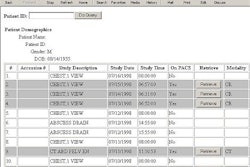The U.S. healthcare system marked October 16 as the day that compliance with HIPAA’s transactions and code sets (TCS) standards are to go into effect -- sort of. The backtracking came on September 23, when the Centers for Medicare and Medicaid Services (CMS) said it would continue to accept and send standard and non-standard versions of any electronic transactions for a limited time period beyond October 16.
Although this reprieve was welcomed by the healthcare community, it was not an all-encompassing panacea for noncompliant TCS.
The CMS contingency plan is for an unspecified period of time. Providers who continue to bill and receive non-compliant formats should still test, and move into production, on the HIPAA-required formats as soon as possible -- or risk a possible cash flow problem, cautioned CMS in its memo announcing the extension.
The memo was issued in response to internal assessments that CMS conducted on its trading partners’ capabilities to comply with the TCS standards. This readiness review is not yet part of the public record.
An independent survey on HIPAA compliance was also conducted by consulting firm Phoenix Health Systems of Montgomery Village, MD, and the Healthcare Information and Management Systems Society (HIMSS) of Chicago, IL. According to the results of the summer survey, much of the healthcare industry is still struggling with HIPAA TCS.
Who’s ready?
Apparently, not enough providers. One of the results of the Phoenix/HIMSS survey was that "predictions of readiness to transmit all required HIPAA transactions have been scaled back by our respondents since the spring 2003 survey: for example, only 62% of payors expect to be able to handle all HIPAA-mandated transactions by October 16 (as compared to 79% in the spring 2003 survey)."
In addition, the survey of 571 healthcare industry professionals found that an average of 62% of all industry segments are currently engaged in TCS testing with trading partners and that less than half of payors and providers have completed required external testing.
The survey held even more ominous information when the data was broken out by payor, vendor, and clearinghouse readiness. In response to a query indicating readiness for accepting/transmitting all HIPAA TCS standards, 62% of payors (down from 79% in the spring 2003 survey), 46% of vendors (down from 68%), and 63% of clearinghouses (down from 86%) expect to meet this goal by the compliance deadline.
The survey also quantified response data from payors and vendors on the basis of relative size. Overall, the larger the payor organization, the closer it was to full TCS capability: 85% of payors covering more than 1.5 million lives, 65% of payors covering between 501,000 and 1.5 million lives, and about 53% of payors covering fewer than 501,000 lives expect to be able to handle all HIPAA transactions by the October 16 deadline, according to the survey.
The survey also measured the compliance readiness of vendors that create software applications that enable the transactions between providers and payors. Oddly enough, the largest vendors were the least ready to meet compliance deadlines, according to the data.
Developers with revenues of more than $100 million indicated a 39% readiness, those with revenues of $50 million to $100 million showed a 60% readiness, and vendors with revenues below $50 million predicted a 45% readiness to handle all standard transactions by the October deadline, according to the survey.
Now what?
"A radiology practice needs to be in contact with its RIS provider and be sure that the software in use supports TCS standards," recommended Joyce Sensmeier, director of professional services for HIMSS.
Healthcare providers also need to insure that their RIS and billing applications are compliant with payors’ electronic transaction standards. There can be as many as 26 separate payor entities that need to be compliance-qualified for the in-house system, Sensmeier noted.
"It’s important that covered entities continue to communicate with their trading partners, including clearinghouses, to determine their status of readiness and to document their own compliance and contingency plan to demonstrate their own good-faith effort to comply," she said.
Most important, she said, a practice should be aggressive in maintaining its contingency plans and in continuing to test its systems with its trading partners.
"Although CMS has granted a reprieve from the October 16 deadline, they did not state how lengthy or how limited that time period would be," Sensmeier said.
A September 11 statement by Leslie Norwalk, acting deputy administrator for CMS, regarding contingency plans and compliance with HIPAA TCS standards bears out Sensmeier’s sense of urgency.
"October 16 is just 35 days away, and all covered entities should be actively working with their trading partners on outreach, testing, and contingency planning. This deadline is the law and we all have to deal with it. It’s not something that can be ignored or brushed aside," he said.
By Jonathan S. BatchelorAuntMinnie.com contributing writer
October 17, 2003
Related Reading
HIMSS offers advice on CMS contingency plan, September 25, 2003
CMS to accept non-compliant transactions after October 16, September 23, 2003
New HIPAA transaction standards in spotlight, September 16, 2003
U.S. health officials warn of potential payment "train wreck", September 12, 2003
Separating HIPAA facts from fiction, May 12, 2003
Copyright © 2003 AuntMinnie.com



















